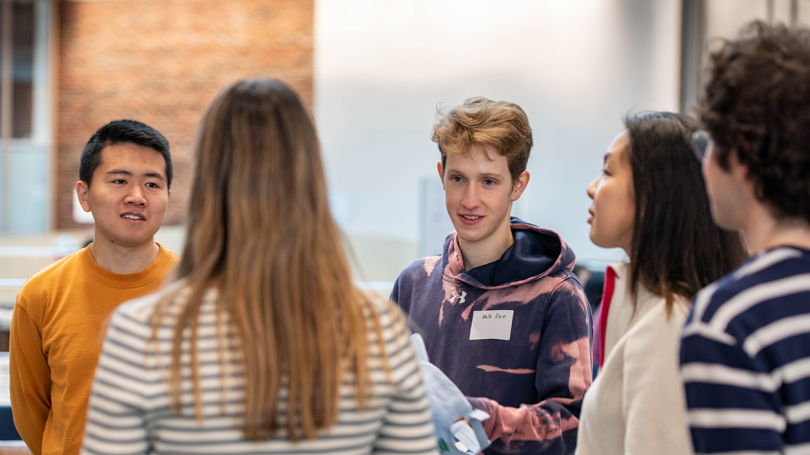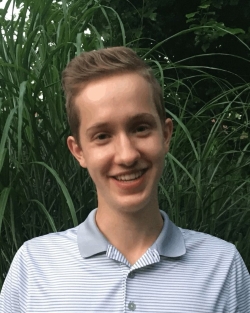

Hometown: Pittsburgh, PA
Major: Electrical Engineering

While Nate Roe grew up in a family that stressed the importance of a liberal arts college education, Dartmouth wasn't necessarily top of mind when he began his college search. His older sisters had dismissed the College as a little too remote for their tastes and Nate didn't know anyone from his high school who had attended Dartmouth. But the more he learned about the school, the more convinced he became that it was the place for him.
"I was interested in doing engineering, and I saw that Dartmouth was a place where you could do engineering and you could do liberal arts. Also, there's definitely a pretty strong thread of sustainability in Dartmouth. For Nate, "the confluence of engineering, sustainability, and the liberal arts" sealed the deal. (The many nearby skiing opportunities didn't hurt, either!)
Nate's interest in energy was an extension of a growing awareness of the threats posed by climate change, something that first came into focus for him in seventh grade. "I was in seventh grade science class," he remembers, "and we had a person come in from one of the research labs at Carnegie Mellon University.... They talked about their research studying carbon dioxide emissions… in tunnels around Pittsburgh… and about this thing, climate change, and it was this dreadful thing, really unpleasant. And I was like, somebody should fix that!"
As Nate learned more, he saw how complex and multifaceted the challenge — and solutions — were. In high school, he dug deep into all the ways that sustainable agriculture, consumer habits, and more played a role in a climate-stable future. But it wasn't until he attended a meeting of the Dartmouth Energy Alliance (DEA) — in fact, the club's first meeting ever! — as a first-year college student, that he zeroed in on energy as a place where he could help contribute to those solutions.
Renewable energy, he says, "sounded like this whole world that I'd never heard about before. So then I went to a couple more meetings and then became more involved. . . ." His involvement with the DEA showed Nate just how interwoven energy is with all kinds of sectors and industries. He began to see that "energy isn't just engineers and grid transmission and investment bankers. . . you want to look at our construction trucks. . . current assets. . . communities and food systems and . . . the air that we breathe the air that's messed up. It's litigators. It's public advocates. It's everyday people. . . . And it was a fascinating, 'liberal artsy' type concept for me at the time as an engineering student, because I said, 'Wow, this is a cool opportunity to explore what an engineered system really is.'"
The connections he made with other students who were involved in the new-and-growing DEA enabled him to see the various ways energy was playing out in his peers' academic and professional journeys. Many of his fellow club members were doing energy-related internships or graduating and going on to careers in the energy space. "I was just drawn to the people…" he explains. "It was clear that there were people in this space at Dartmouth, and really in the world, who were excited about addressing an existential problem. Which is, for me, pretty hard to turn away from."
Nate quickly became one of the DEA's leaders, and focused on helping the club grow and evolve beyond "just a book club." The group does choose an energy-focused book each term to read together and discuss, but it is also focused on offering other kinds of opportunities for Dartmouth students to learn from. One such opportunity was a spring break 2021 trip with seven other club members to Washington, DC to attend the American Council on Renewable Energy (ACORE) policy forum. Getting the opportunity to sit in on sessions with people from private industry to the US government was "a really big moment," for Nate. Climate change and energy weren't "just something young people were riled up about," he realized. People from all sectors were working on the problem in a focused way. "That event put some fire in my belly… like, well, we've really got to try our best as a club to serve students… and give them more opportunities like this. Because these are such emboldening and exciting opportunities as an energy student at Dartmouth."
The DEA during Nate's tenure at Dartmouth has indeed expanded in size and ambition. The club hosted the first Dartmouth Energy Hack in fall 2022, which he notes as one of the many highlights of his experiences in energy at Dartmouth. But some of his favorite moments have ones where he's had opportunities to connect with others and understand the many pathways that can lead to an interest in energy. "I think some of my favorite interactions have been end-of-term DEA meetings, when like, just a few students show up. They're just there because they're curious and they want to know more. And it's great being able to connect with them and hear their stories and hear why they're excited about energy."
After graduation and some summer travel, Nate will head to Boston to work for NorthBridge Group, a leading economic and strategic consulting firm that serves the electricity and natural gas industries, where he'll be working on renewable energy projects.
When asked if he had any advice for incoming Dartmouth students, he recalls some advice his friend Max gave him: "Let your actions be a reflection of your intentions, not your fears." In other words, says Nate, don't spend too much time worrying about what others think about you or what could happen if you try something new and it doesn't turn out how you expected. "Trust yourself as the person in the driver's seat of your life, pursue what you're interested in. And to be flexible to figure it all out."